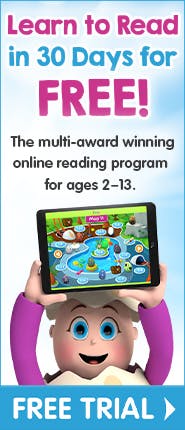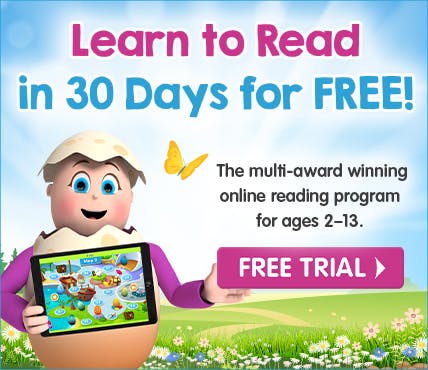


Reading Games – Make Learning Fun for Kids

Reading games for kids help boost literacy skills and they are lots of fun! Whether your child is learning to read, needing more practice to read fluently, or now ready to start reading for meaning, get your child excited about learning today.
Reading games for kids help to unlock the magic of reading through play. Mary Poppins was right: “In every job that must be done there is an element of fun. You find the fun and snap! The job's a game!” Reading is no exception. Reading success is directly related to the amount of time a child spends on reading activities. Reading games can nurture a love for reading in children, motivating them to stay on task and get them wanting to come back for more.
In this article we'll explore how reading games can make the (often challenging) task of learning to read an enjoyable and fun experience for children. We’ll cover a range of activities for different learning needs and opportunities – from online interactive games, providing a seamless blend of education and entertainment, to DIY reading games for creative learning at home or ‘on the go’ when you’re out and about. We’ll also discuss the benefits of reading games and how they help children learn.
Contents:
Learn-to-Read Reading Games
Reading Fluency Games
Reading Comprehension Games
Interactive Online Reading Games
10 Fun DIY Reading Games to Play at Home
Reading Games to Play 'On the Go'
6 Ways Fun Reading Games Help Children Learn
Why Parents Love the Online Reading Games in Reading Eggs
Learn-to-Read Reading Games
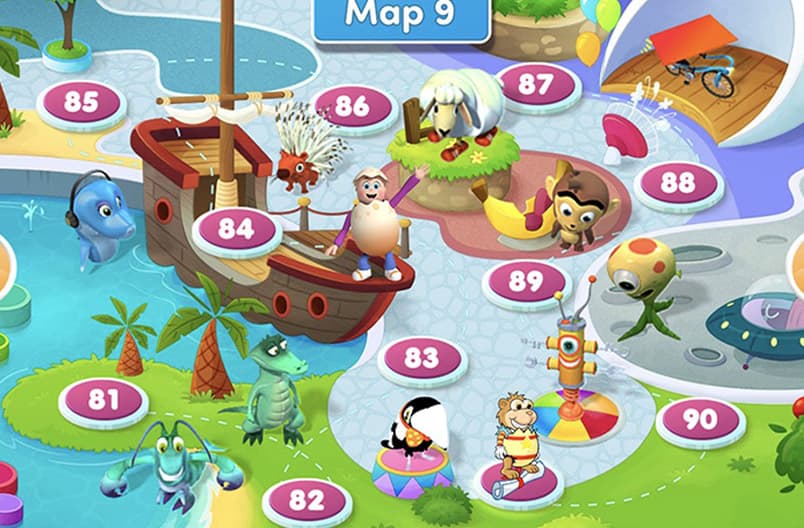
Learn-to-read reading games provide easy-to-navigate educational fun for toddlers and preschoolers.
Starting on the journey of learning to read is a huge step in a child’s development. Online learn-to-read reading games such as Reading Eggs Junior and Reading Eggs provide easy-to-navigate games for toddlers and preschoolers, helping them take the first steps into the liberating world of recognizing letters, sounds and words. In addition, the interactive nature of game-playing improves their cognitive abilities and keeps them actively involved in the learning process.
The very first lessons for pre-readers and very early readers take place in a child-friendly, child-safe virtual world, moving children from a zoo, to a playground, to a theme park. Young learners love following the structured maps in this virtual world and moving their character along a “path”, which is easy to see on the screen and looks like a board game.
Try hundreds of online reading games for FREE!
Reading Eggs provides hundreds of online reading games for kids aged 2–13.
Reading Fluency Games
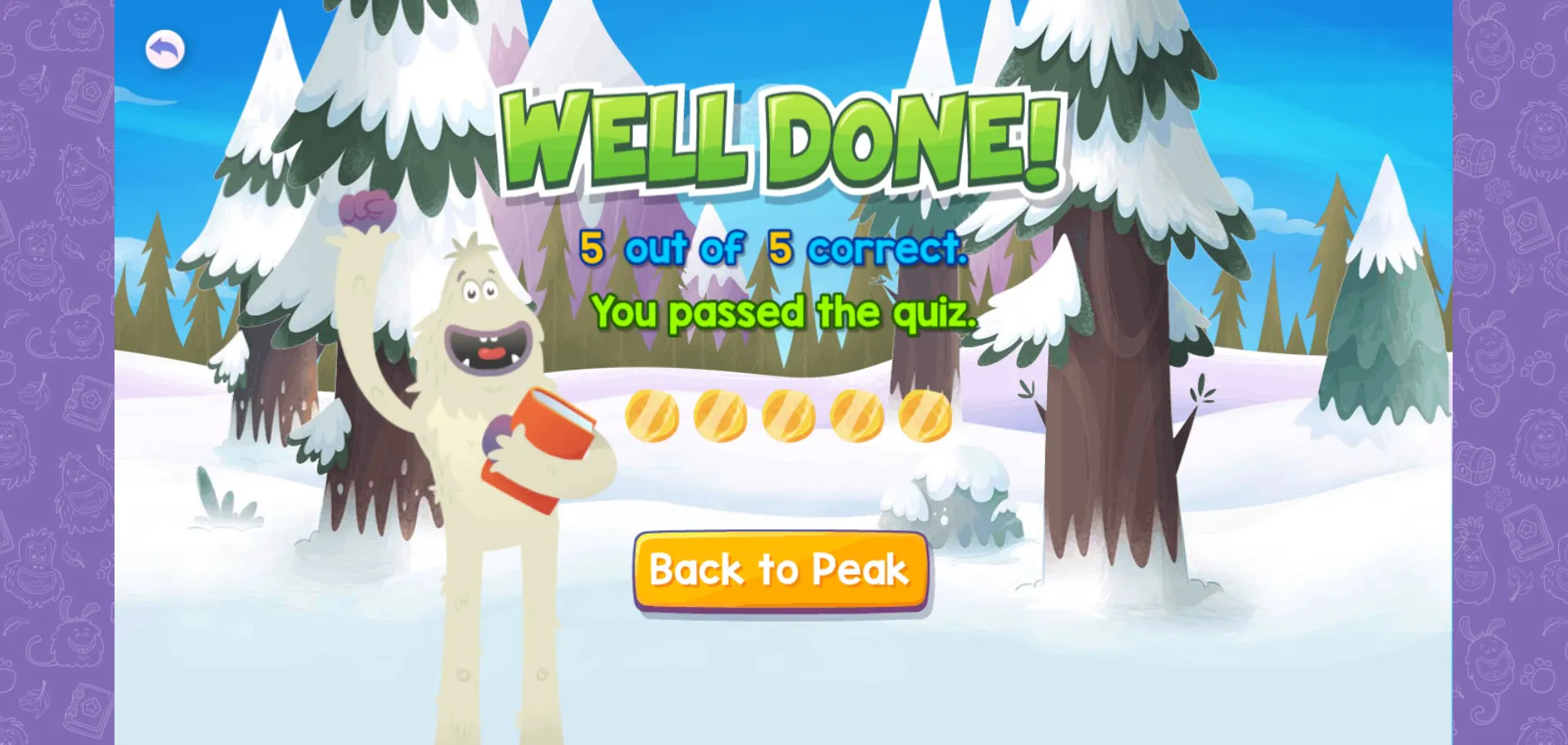
The reading fluency games in Fast Phonics reinforce letter-sound associations and provide opportunities for practice and repetition. Free trial.
Once a child has conquered the basic skills of learning to recognize letters, sounds and simple words, the focus moves to reading for fluency. That is, reading for speed without the need to slowly sound out each letter or phoneme (sound). This takes a lot of practice and repetition, which potentially could be tedious. But reading games make it fun!
Through interactive lessons and engaging activities, kids develop the confidence to read smoothly and effortlessly. Reading games provide a platform to expose them to letters, sounds and words repeatedly in new and exciting ways without becoming boring. Engaging graphics and activities make the lessons fresh and novel, and often amusing. Highly motivating kids’ reading games that offer consistent rewards encourage even the most reluctant readers to actively participate.
The immersive world of Fast Phonics (for ages 5–10) delights children as they master phonics by completing reading games and end-of-lesson assessments. With engaging challenges and beautiful graphics, the games accelerate your child's phonetic understanding, paving the way for proficient decoding.
Reading Comprehension Games
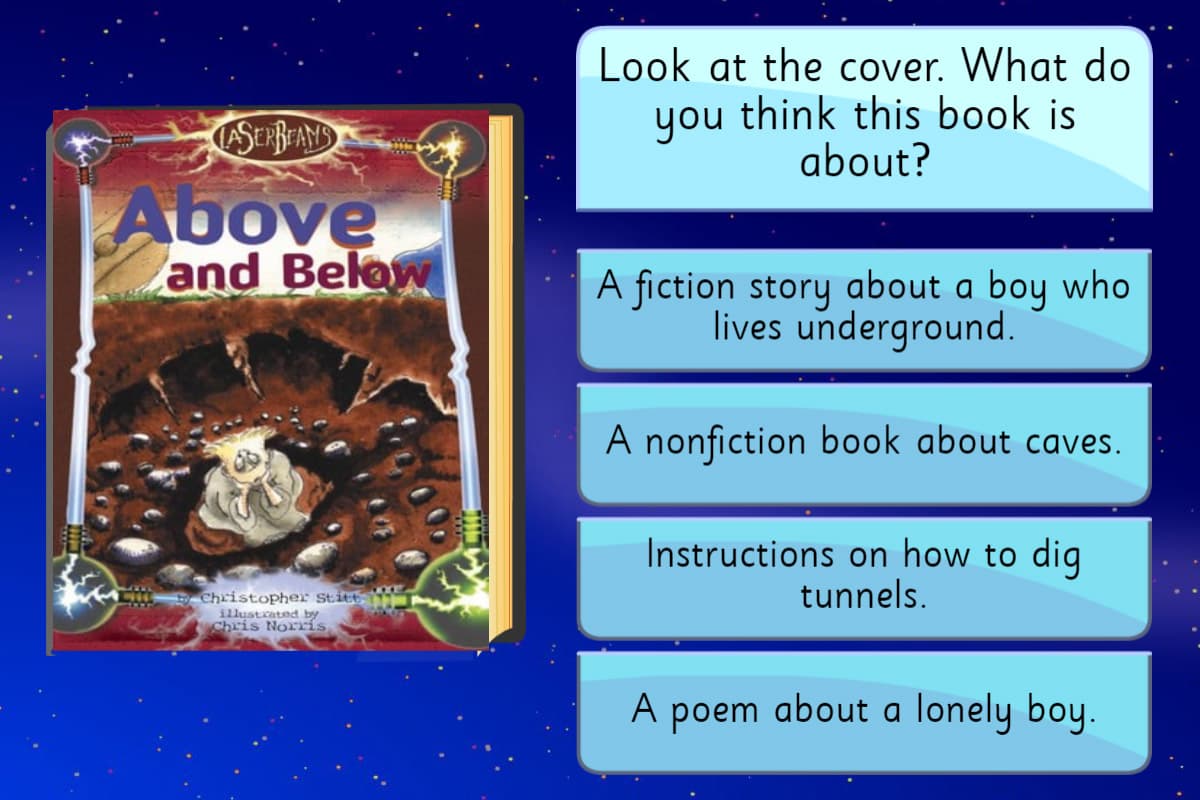
Reading comprehension games help kids unlock the meaning of words on the page. Free trial.
Then, when they’ve mastered the basics and can read fluently, it’s time to focus on reading comprehension. Comprehension is unlocking the meaning of words on the page beyond identifying just letters and sounds. We like to refer to it as ‘reading for meaning’. It’s the final, yet crucial, step in the learn-to-read journey.
Reading comprehension games cover various aspects of comprehension, from identifying main ideas and drawing inferences, to understanding context and making connections. Whether exploring fictional stories or informative non-fiction texts, each activity is designed to stimulate critical thinking and promote a deeper engagement with the written material.
Reading Eggspress, developed for ages 7–13, offers a more advanced reading experience. It covers comprehension, vocabulary and grammar, ensuring a well-rounded approach to literacy.
Interactive Online Reading Games
Interactive online reading games are a great way to get kids practising their reading skills. Children love the cute characters, bright colours and fantastical worlds these games offer. Carve out a short amount of time they can look forward to – 15 minutes a day is enough. Choose positive screen time for your child with online reading games that are kidSAFE and part of a comprehensive, science-based reading program, such as Reading Eggs.
Designed by highly experienced educators and literacy experts, Reading Eggs incorporates all five key literacy areas in the structure of its lessons. Instructions are embedded in game-like activities that encourage kids to play as they learn. All games relate directly to the content of the lesson and, after lesson 9, culminate in reading an e-book. All the reading games in Reading Eggs, as well as all lessons, are designed to get kids to enjoy reading and learn how to read books.
A sequence of online lessons filled with fun, interactive reading games
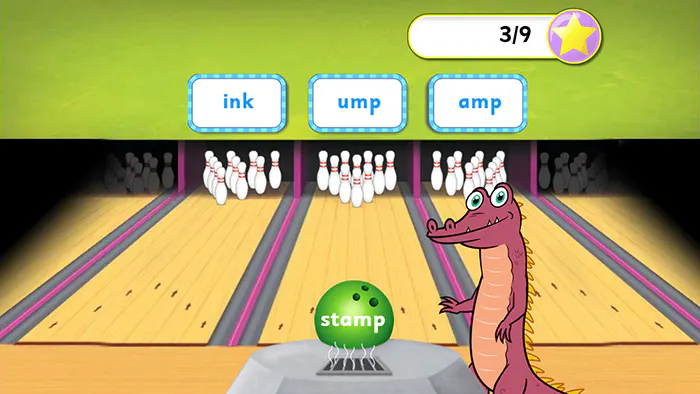
Reading Eggs teaches children aged 2–13 key reading and literacy skills with interactive, online reading games and lessons. Free trial.
Children begin Reading Eggs by completing a placement test, which matches them to the appropriate level. From there, each lesson progresses at the child’s individual learning pace. Fun characters guide children through each activity and sing catchy songs that kids love.
Inbuilt reward systems help children stay motivated to learn as they play. These Reading Eggs reward systems are high-interest, compelling and child-centred. They are activated each time a child completes a learning activity or a lesson.
When kids complete each Reading Eggs activity, they are rewarded with golden eggs. These eggs get deposited into their personal ‘Eggy Bank’ for them to spend on clothes for their Reading Eggs character, and furnishings for their character’s tree house.
This provides a rich, multi-dimensional reward system that encourages a high level of interest and participation from kids. As children watch the golden eggs land in their Eggy Bank, they can see the clear link between their rewards and their work in the program.
Try hundreds of online reading games for FREE!
Reading Eggs provides hundreds of online reading games for kids aged 2–13.
10 Fun DIY Reading Games to Play at Home

Make learning fun with DIY reading games you can play at home using readily available materials.
Here are some DIY reading games for kids that you can try at home. The easy ideas below can be pulled together quickly from materials you have lying around the house. They’re a great way for children to learn essential literacy skills while having fun.
1. Find a Word
Designate a word to your child that they don’t already know and ask them to find that word in a book, newspaper, magazine or other text. After your child has found their designated word, have them choose a word that they already know. Ask them to find two examples of their word being used in different ways. For example, the word ‘face’ can be used as both a noun, ‘he had a smile on his face’, or as a verb, ‘he had to face the school principal’.
Make sure your child writes down these words and their definitions in a notebook, including the sentences they were found in so that they remember the different ways the same word can be used.
2. Word Groups
Write down a word on a piece of paper and ask your child to write down as many related words as they can. For example, for the word ‘fruit’ your child can list ‘apple, orange, watermelon’ etc. Or for the word ‘exercise’, they can list ‘running, swimming’ etc. Once your child has finished listing related words, ask them to write each word in a sentence. Writing a list of related words with a common theme makes it easier for your child to commit these words to their memory.
3. Complete the Word
This activity helps develop your child’s listening, spelling and vocabulary skills. All you need to do is create a list of compound words, that is, words that are made up of two smaller words. For example, ‘everything’, ‘meantime’, ‘butterflies’, etc. Read this list out to your child, but only read the first part of each word, e.g. ‘every’ in ‘everything’, and ask your child to work out the remainder of the word. Some compound words may start with a word that can be joined with several words, e.g. ‘everything’, ‘everyone’, ‘everywhere’. If your child is ready for a challenge, you can ask them to list ALL the possible variations.
4. Rhyme Search
Have kids search through old magazines or newspapers and cut out pictures of things that rhyme. Then get them to glue or tape the clippings onto sheets of paper. Use a new sheet for each rhyme so they can easily see how the sounds are different on each.
5. Dictionary Search
Choose 10 words that your child is likely to struggle with from a book they are currently reading. Have your child look up the words in the dictionary and write down the meaning. This will build up their vocabulary and writing skills, as well as help to familiarize them with the dictionary.
6. Madlibs
Madlibs is a fun reading game for children that gets them to complete stories by filling in the blanks with either nouns, verbs, adjectives, or adverbs, as directed. This inexpensive game is great on road trips and teaches kids to read for meaning as well as familiarizes them with speech.
7. Matching Rimes and Onsets
A fun way to help your child learn crucial decoding skills is by playing with rimes and onsets. A rime refers to the string of letters that follow an onset, which is the first phonological unit of any word.
You can play with rimes and onsets by cutting out pieces of cards and writing a phoneme on each one. For example, ‘b’, ‘c’, ‘f’, ‘p’, ‘r’, ‘s’, ‘m’, and ‘h’. Write the letters ‘at’ on a separate piece of paper. Ask your child to look at the rime at and decide if they have a phoneme that would correctly complete the word (e.g., ‘b’ + ‘at’ = ‘bat’).
8. Scavenger Treasure Hunt
Create a scavenger hunt for kids using written notes, each one a clue to the next destination along the path to discovering treasure. The excitement of the hunt for treasure is a great incentive for children to read each note carefully to correctly unlock the clue and continue the hunt.
9. Easter Hunts with Hints
The classic Easter hunt is a fantastic opportunity to practise reading and comprehension skills. Hide your Easter eggs around the house or in the garden. If it's not Easter, you can use different items like your child's favorite treat, books or toys.
Write some fun clues on a piece of paper, for example, ”I’m bound to get wet in the place I'm hiding“ (shower, sink, near the hose), “You might find me admiring my reflection” (by the mirror), or “Flowery and green is where I can be seen” (plants). Hand out your written clues to participants and let them have fun helping each other read and decipher each hint.
10. Category Reading Games
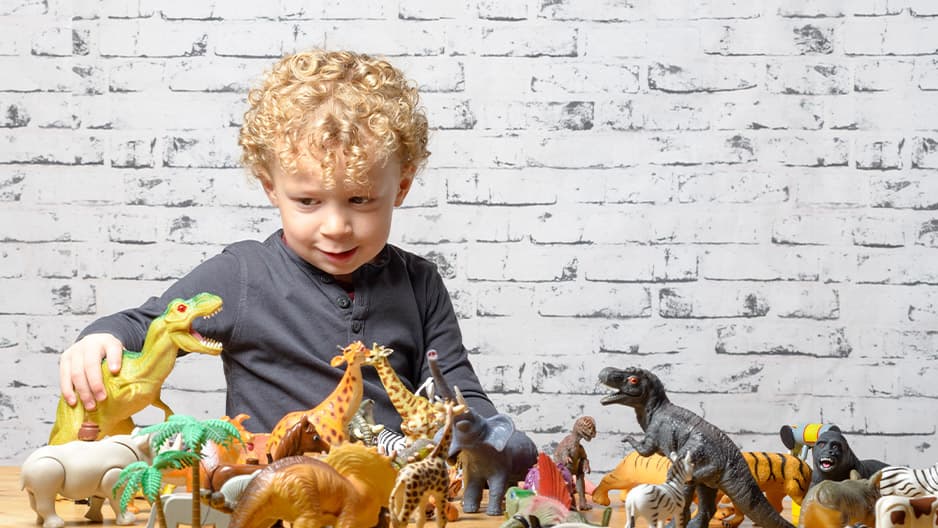
Reading games help children build vocabulary and comprehension skills.
You can play category games with your child after reading a book as a helpful way to recall new words and ideas, building their vocabulary and reading comprehension skills.
For example, if the book features animals, ask your child to name as many animals as they can think of, including any new ones they may have learned from the book. You can also ask your child to group the animals in different ways, such as by where they live or their number of legs. For a book about Egyptian history, you could ask them to list words under the categories of ‘diet’, ‘buildings’, ‘rituals’, or ‘fashion’.
Encourage your child to choose a book about their favorite topics and watch their enthusiasm as they play this game.
Reading Games to Play ‘On the Go’

Make the most of long car drives with reading games to keep the kids entertained and learning on the go.
Some reading games don’t need any extra materials and are perfect to keep kids entertained and learning on-the-go. Try to use the world around you in creative ways when you’re on a long car ride, strolling to the shops, or even while waiting for an appointment.
Letter Hunt Reading Game
Letter hunts are a fun way to build your child's reading and spelling skills. Ask your child to spell a word that they know, such as their first name, then try to find each letter of that word printed somewhere around you.
Start by trying to find the first letter of the word on objects such as licence plates, road signs, billboards and posters. You can prompt your child with something like, “The first letter in your name is 'S', can you find a sign or poster with an 'S' on it”, and so on.
Re-enact Stories
Children love pretend play, and when your child acts out or retells the stories you've read together, they're demonstrating and enhancing their comprehension skills – an essential part of learning to read.
Ask your child to act out a story in the right order and take on different roles. This will help them gain an understanding of narrative structure and consider how different characters have different personalities and motivations.
6 Ways Fun Reading Games Help Children Learn
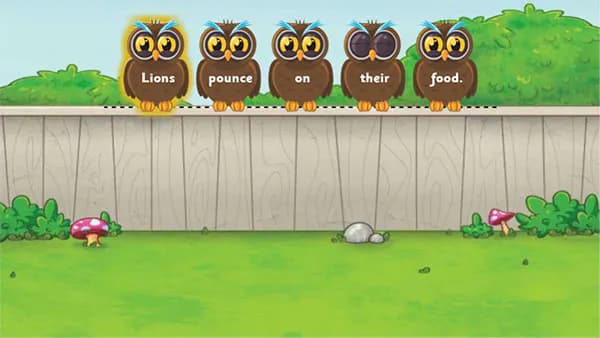
Reading Eggs uses a wide range of short, highly motivational reading games for kids that cover the five essential components of reading. Free trial
Reading games make learning to read a fun and enjoyable activity. But it’s easy to question why it is so important for kids to enjoy learning. After all, isn’t it more important what a child is learning, rather than how they are learning? Interestingly, educators and researchers have found that it very much matters how a child learns. The more interactive learning is, the more enjoyable, and therefore the more motivated students are to continue engaging in that activity. And here’s why it matters: the more time a child spends on a certain task, the more they learn.
This is certainly the case for reading and its relation to reading games. Reading success is directly related to the amount of time a child spends on the activity of reading.
Here are several ways in which reading games contribute to the development of reading skills in children:
1. Motivation and Interest
Games are inherently fun and can capture a child's interest and motivation. When learning to read becomes a game, children are more likely to stay engaged and motivated, promoting consistent practice.
2. Repetition and Reinforcement
Games provide a platform for repeated exposure to letters, sounds and words. Repetition is crucial for reinforcing learning and helping children memorize common words and letter-sound associations.
3. Multisensory Experience
Many reading games incorporate audio, visual, and sometimes tactile, elements. This multisensory approach can benefit different types of learners and enhance overall comprehension and retention.
4. Feedback and Rewards
Games often provide immediate feedback, allowing children to correct mistakes in real-time. There can also be a reward involved when they achieve the correct result. This positive reinforcement helps solidify correct reading habits and fosters a positive learning experience.
5. Social Interaction
Reading games can be designed for group play, encouraging social interaction and collaboration among children. Social engagement can make the learning experience more enjoyable and memorable.
6. Progress Tracking
Many educational reading games come with progress tracking features. Parents and teachers can monitor a child's performance, identify areas that need improvement, and provide tailored support.
Reading games can be wonderfully fun. However, it is not just by engaging in any interactive reading games that kids gain literacy skills. The reading games must be matched to the child’s level of reading ability.
Online Reading Programs that Feel Like a Game
Researchers have found literacy programs that use fun and motivational reading games are very effective in teaching children how to read and they are a great way to get kids to practise their reading skills. Positive screen time with fun reading games can enhance the educational experience.
However, to be truly effective, a reading program will need to provide instruction in the following core areas of literacy, the five components of reading, and not just entertain children:
Phonemic awareness
Phonics
Fluency
Vocabulary
Text Comprehension.
All games and activities within effective reading programs should have as their goal children learning to read fluently and for meaning.
Reading Eggs incorporates all five key literacy areas in the structure of its lessons, with instructions embedded in game-like activities that encourage kids to play as they learn. All games relate directly to the content of the lesson and, after lesson 9, culminate in reading an e-book. All the reading games, as well as all the lessons, are designed with the purpose of getting kids to read real books and to enjoy reading.
Phonemic Awareness
A word is rarely just a single sound. Most words are made up of a number of smaller units of sounds, called phonemes. For instance, the simple word ‘cat’ is made up of three phonemes, /c/a/t/. Phonemic awareness is the ability to hear, identify, and manipulate those individual sounds in spoken words in order to use the phonemes like building blocks to make new words.
Reading Eggs concentrates on phonemic awareness early in the program. Strategies for developing phonemic awareness include reading games and activities that feature:
Nursery rhymes
Listening skills
Sound play
Alphabet books.
These lessons engage young readers in activities that help their phonemic awareness to develop and flourish. Later in the program, readers listen to words to discern the lesson’s focus sound. They work with onsets and rhymes, such as c-at, b-at, r-at, so that they become adept at breaking words into smaller parts. Being able to manipulate phonemes builds phonemic awareness skills, which when combined with phonics, rapidly increases a student’s bank of readable words.
Phonics
Phonics instruction helps beginning readers to link letters to sounds (phonemes) to form letter-sound correspondences and spelling patterns. Children can use this strategy in their reading to see how letters and sounds relate.
Reading Eggs uses a synthetic phonics approach with lessons and reading games that map individual letters, or letter combinations, with their appropriate sound. Each letter of the alphabet is introduced in its own lesson, which reinforces the relationship between letters and sounds. It also draws young readers’ attention to the alphabetic principle, the notion that sounds relate directly to the letters of the alphabet.
Fluency
Fluency enables readers to span the gap more quickly between recognizing a word and understanding the meaning. It’s where the magic of reading takes place. Fluent readers spend less time sounding out and decoding words and more time on the meaning of a text. Researchers agree that repetition of reading activities is a highly effective strategy for reading more fluently.
The Reading Eggs program uses a range of strategies for reading fluently, such as:
Demonstrating the fluent reading of a book
Re-reading books
Comprehension activities.
Vocabulary
Each child approaches reading with a differing level of vocabulary knowledge. Building a child’s bank of known words is a great strategy for improving reading.
Reading Eggs offers focused reading games that help build a child’s vocabulary, but also offers lessons in grammar and spelling as well. This not only builds up vocabulary, it also teaches kids how to both spell a word and use the word properly in a sentence. Instruction in these areas is another way that Reading Eggs offers kids great strategies for reading and writing.
Reading Eggs also accommodates children with a wide range of differing abilities; the program can assist readers who may need extra help with vocabulary.
Text Comprehension
Strategies for assisting readers with text comprehension include teaching children how to:
Answer questions about a text
Ask questions of a text
Monitor their comprehension
Put a jumbled-up text back in the right order
Recognize story structure.
The goal of every Reading Eggs lesson and reading game is getting kids to read real books. Every literacy skill is taught to help kids learn to read, and incentives and prizes are offered to help them enjoy the process of learning to read even more.
Try Reading Eggs for Free
Reading Eggs’ highly motivational reading games for kids encourage even the most reluctant readers to actively learn and improve. It’s the reason why over 91% of parents report a noticeable improvement in their child’s reading skills within weeks of using Reading Eggs.
Try it for yourself and see how your child’s reading can improve with Reading Eggs. Start your free trial here.
Why Parents Love the Online Reading Games in Reading Eggs
“My daughter loves Reading Eggs! She is so excited by the progress she has made through the program. She enjoys the games and is learning so much. I highly recommend it. It is great for learning phonics and letter sounds. The games are fun and educational. We will continue to use Reading Eggs until she is reading on her own!”
- Alycia A.
“Our students love this site. It is bright, entertaining, engaging and educationally sound. What a fun way to learn to read! They can’t get enough of it and ask regularly, ‘Is it our turn on Reading Eggs today?’”
- Katrina Kruger, Elliot Heads State School
“AMAZING! We continue to be surprised by how quickly and how enthusiastically all of our children are taking to reading, all thanks to Reading Eggs – we are telling everyone we know about it!!!”
- Fiona
“Reading Eggs is great for my preschool aged child who is just learning to read and for my 6-year-old fluent reader. My younger child is engaged by the lessons and also motivated by the games and rewards. A surprise benefit is that his computer and keyboard skills are improving. My 6-year-old uses Reading Eggs for her spelling and basic grammar. She is working on her sequencing and creative writing skills by composing stories on Reading Eggs. Even the games develop reading, math and logic skills. I really see this as a website we can use from preschool through grade 3 with academic benefit.”
- Jennifer Ware
“I liked the way each letter is introduced, the activities, the games, the ease of use for students, the graphics and colour, the sound and the whole overall look of the program.”
- Vicki
“My children love Reading Eggs! I've seen one reluctant reader grow in confidence and an emergent reader gain fluency. They have fun while learning and constantly ask if they can "play" on Reading Eggs.”
– Steph K.
“Just wanted to say how wonderful I think Reading Eggs is! I have two children, 5 and 7, who beg me to play on your program constantly. With so much junk on the net it's great to be able to avoid it all and send my kids to the computer knowing how much they can learn and play with Reading Eggs!”
– Amy
“I would just like to say a big thank you to Reading Eggs. What a wonderful learning tool this is. My daughter is 10 years old and has Down Syndrome. She has not been given any opportunity to learn to read and write at her school which is so disappointing and heart-breaking as she desperately wants to learn and be like her brother and sister. She started using Reading Eggs over the weekend and I am astounded at how quickly she is picking up simple words and sentences. She is so eager to get on and 'play' the wonderful and engaging games. I can't thank you enough, I wish I found you earlier. I know that she will be reading and writing in no time using this site. She is so pleased with herself and what she has achieved so far. Thanks again.”
– Kerstin
“Reading Eggs has helped my daughter tremendously! I knew she had the capability to read, even at a young age, but she had no motivation to actually want to learn how. I hired a private tutor to help her, but even after a semester of kindergarten, hardly any progress. Someone suggested Reading Eggs to me and to my surprise, within two weeks of using, she had doubled her sight word list and now loves reading everything (she's in 1st grade now). I completely recommend you try it for your child. It's fun, very interactive, and as a parent you can track their progress and print supplemental worksheets for the lessons. They are in a very complete reading system you'll love!”
– Sarah Grey
“My daughter is 6 and in Year 1 at school. She didn't 'get' reading and I was beginning to really worry that we might have a problem. We have tried all manner of books, charts and extra help, but the progress was painfully slow, almost to the point of non-existence. A friend mentioned Reading Eggs in passing [and] in a matter of weeks she is flying along like never before. She absolutely LOVES Reading Eggs (as do her siblings) and asks to go on the computer morning, noon and night to do it. It's such a lovely, colourful, fun, funny, and educational site, and the reward system of levels, eggs, certificates and games are so well thought out. I just wanted to say hurray and thank you.”
– Sanchia
“My child LOVES Reading Eggs! This program has been exactly what I've been looking for. We tried two other popular reading programs and while they were fun, just didn't translate to my child becoming a reader. He's a reluctant reader, capable but frustrates easily. With Reading Eggs I have never witnessed an ounce of frustration, just watched my son having fun. And even better – I've watched him start to read in such a natural progression that is a beautiful thing to watch. Thank you, Reading Eggs!”
– C. Bryant
